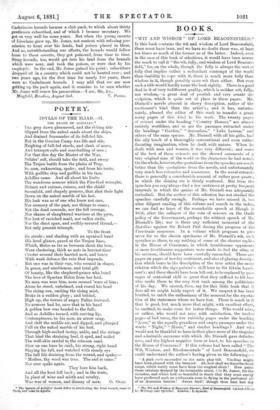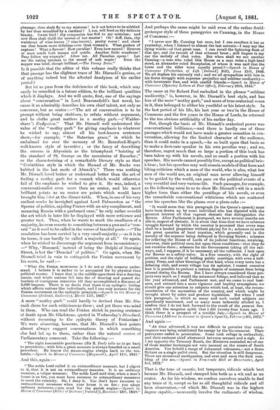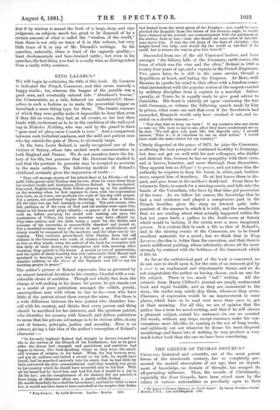BOOKS.
" WIT AND WISDOM " OF LORD BEACONSFIELD.'
IF this book contains the wit and wisdom of Lord Beaconsfield, there must have been, and we have no doubt there was, at least ten times as much of the former as of the latter. Indeed, even in the case of this book of selections, it would have been nearer the mark to call it "the wit, folly, and wisdom of Lord Beacons- field," for, on the whole, though the folly is always the sort of folly that implies rather a redundant contempt of the world than inability to cope with it, there is much more folly than wisdom in it though possibly more wit than either. But even such a title would hardly name the book rightly. There is a good deal in it of very indifferent quality, which is neither wit, folly, nor wisdom,—a great deal of poorish and very ornate de- scription, which is quite out of place in these pages. Mr. Disraeli's novels abound in showy description, rather of the auctioneer's kind than the artist's ; and it has, unfortu- nately, pleased the editor of this work to transfer a great many pages of this kind to his work. The twenty pages of extract under the heading " Country Houses," are almost entirely worthless, and so are the passages extracted under the headings " Garden," " Jerusalem," " Lake Leman," and others of the same species. Mr. Disraeli with all his gifts, had the oily touch of a thoroughly conventional and even rather flaunting imagination, when he dealt with nature. When he dealt with men and women, it was very different; and some of the best of these extracts are the shrewd comments of a very original man of the world on the characters he had noted. On the whole, however, the quotations from the speeches are much
better than the quotations from the novels, and unfortunately very much less extensive and numerous. In the novel-extracts there is generally a considerable amount of rather poor quartz, in which the shining ore is thinly scattered. But from the speeches you may always find a few sentences at pretty frequent intervals in which the genius of Mr. Disraeli was adequately embodied. But the author of this selection has not studied the
speeches carefully enough. Perhaps we have missed it, but after diligent reading of this volume and search in the index, we can find no trace of the remarkable speech at Slough in 18Z,S, after the collapse of the vote of censure on the Oudh policy of the Government, perhaps the wittiest speech of Mr. Disraeli's life; nor is there any sufficient memorial of the diatribes against Sir Robert Peel during the progress of the Free-trade measures. In a volume which proposes to pre- serve for us the chosen specimens of Mr. Disraeli's wit, such speeches as these, to say nothing of some of the shorter replies in the House of Commons, in which troublesome opponents or more troublesome supporters were made to feel the sting of his sarcasm, should have been carefully ransacked. There are pages on pages of tawdry sentiment, and also of glaring descrip- tion which bears to the description of the true artist the same relation which the sign-painter's skill bore to Sir Edwin Land- seer's ; and these should have been left out, to be replaced by pas- sages of oratorical skill so great that they sufficed to lift him who spoke them to the very first rank among the politicians of his day. We cannot, then, say for this little book that it does all we might fairly expect of it. We suspect it has been hurried, to catch the enthusiasm of the moment for the reputa- tion of the statesman whom we have lost. There is much in it that is good, but much more that might, with excellent effect, be omitted, to make room for better things. Who would miss, or rather, who would not miss with satisfaction, the twelve pages of bad verse, the five rubbishy pages under the heading " Love," or the equally grandiose and empty passages under the words " Night," " Music," and similar headings ? And who would not be thankful to have in their place more of the singular and admirable sarcasms with which Mr. Disraeli gave definite- ness, and the highest negative form at least, to his speeches in the House of Commons ? If this volume had been called "The Wit, Wisdom, and Rhodomontade " of Lord Beaconsfield, we could understand the author's having given us the following :—
" A pink carte succeeded to the satin play-bill. Vitellius might have been pleased with the banquet. Ah, how shall we describe those soups, which surely must have been the magical elixir ! How paint those ortolans dressed by the inimitable artist, a la St. James, for the occasion, and which look so beautiful in death that they must surely have preferred such an euthanasia even to flying in the perfumed air of an Ausonian heaven! Sweet bird ! though thou bast lost thy • The Wit and Wisdom of Benjamin Disraeli, Earl of Beaoonsfield. Collected from his Writings and Speeches. London : Longman.
plumage, thou shalt fly to my mistress ! Is it not better to be nibbled by her than mumbled by a cardinal ? I, too, will feed on thy delicate beauty. Sweet bird ! thy companion has fled to my mistress ; and now thou shalt thrill the nerves of her master ! Oh ! doff, then, thy waistcoat of wine-leaves [? vine-leaves], pretty rover ! and show me that bosom more delicious even than woman's. What gushes of rapture ! What a flavour ! How peculiar ! Even how sacred ! Heaven at once sends both manna and quails. Another little wanderer ! Pray follow my example ! Allow me. All Paradise opens ! Let me die eating ortolans to the sound of soft music ! Even the supper was brief, though brilliant.—The Young Duke."
Is it possible that the editor of this volume really thinks that that passage has the slightest trace of Mr. Disraeli's genius, or of anything indeed but the affected dandyism of his earlier
period ? But let us pass from the deficiencies of this book, which may
easily be remedied in a future edition, to the brilliant qualities which it displays. And we will quote, first, one of the sayings about " conversation " in Lord Beaconsfield's last novel, be- cause it so admirably describes his own chief talent, not only as converser, but as orator :—" The art of conversation is to be prompt without being stubborn, to refute without argument, and to clothe great matters in a motley garb.—(' Walder- share ') Enck»tion." That Mr. Disraeli well understood the value of the "motley garb" for giving emphasis to whatever he wished to say, almost all his best-known sentences show,—for example, " the Batavian grace," in which he
embalmed for ever the memory of Mr. Beresford-Hope's well-known style of invective ; or the fancy of describing the success in Abyssinia as the triumphant " hoisting of the standard of St. George on the mountains of Rasselas ;" or the characterising of a remarkable literary style as that " Corinthian style in which the Mwnad of Mr. Burke was habited in the last mode of Almack's." There was nothing Mr. Disraeli loved better or understood better than the art of finding a motley garb for a remark which would otherwise fail of the emphasis he wished to give it. He was, indeed, a
conversationalist even more than an orator, and his most brilliant points as an orator are points which would have brought him éclat at the dinner-table. When, in one of his very
earliest works he inveighed against Lord Palmerston as " the Spores of politics, cajoling France with an airy compliment, and menacing Russia with a perfumed cane," he only rather overdid the art which in later life he displayed with more reticence and greater tact. Thus, when he wants to mark the smallness of a majority, he even resorts to something between a pun and a" con- ceit " as it used to be called in the verses of fanciful poets :—" The resolution has been carried by a very small majority ;—as it is in its teens, it can hardly be called a majority at all." Or again, when he wished to discourage the argument from inconsistency : —" Why, Hansard,' instead of being the Delphi of Downing Street, is but the Dunciad of politics." Or again, when Mr. Disraeli tried in vain to extinguish the Fenian movement by his scorn, he said :-
" What the Fenian movement is I do not at this moment under- stand. I believe it is rather to be accounted for by physical than political causes. I know that in the middle-ages there was a dancing mania, and whole nations fell into fits of dancing and passed the borders of contiguous countries till they accomplished a distance of 3,000 leagues. There is no doubt that there is an epileptic feeling which affects nations like individuals, and I can only account for the Fenian movement on the epileptic principle.—Speech in the House of Commons (Ireland, Railways), March 15th, 1867."
A more " motley garb could hardly be devised than Mr. Dis- raeli chose for such criticisms as these ; and yet there was mind in them. Who can read the Fenian shriek in passing sentence of death upon Mr. Gladstone, quoted in Wednesday's Standard, without recurring to the epileptic theory of Fenianism ? We were observing, however, that Mr. Disraeli's best points almost always suggest conversations in which something else had led up to them, rather than the natural course of Parliamentary comment. Take the following :-
" The right honourable gentleman (Sir R. Peel) tells us to go back to precedents ; with him a great measure is always founded on a small precedent. He traces the steam-engine always back to the tea- kettle.—Speech in House of Commons (Maynooth), April 11th, 1845."
And this, again :— " The noble Lord called it an extraordinary measure, but I object to it, that it is not an extraordinary measure. It is an ordinary measure, a vulgar measure. The noble Lord said that, when a man's house is on fire, you must have recourse to extraordinary measures to meet the calamity. Sir, I deny it. You don't have recourse to extraordinary measures when your house is on fire ; you adopt ordinary measures,—you send for the parish engine.—Speech in House of Commons (Relief of Distress [Ireland]), November 16th, 1844."
And perhaps the same might be said even of the rather florid- grotesque style of these panegyrics on Canning, in the House of Commons :—
" I never saw Mr. Canning but once, but I can recollect it but as yesterday, when I listened to almost the last accents—I may say the dying words—of that great man. I can recall the lightning flash of that eye, and the tumult of that ethereal brow ; still lingers in my ear the melody of that voice. But when shall we see another Canning—a man who riled this House as a man rules a high-bred steed, as Alexander ruled Bacephalus, of whom it was said that the horse and the rider were equally proud ?—Speech in House of Commons (Protection of Life [Ireland] Bill), June 15th, 1846. We all deplore his untimely end ; and we all sympathise with him in his fierce struggle with supreme prejudice and sublime mediocrity— with inveterate foes, and with candid friends.—Speech in House of Commons (Opening Letters at Post Office), February 28th, 1845."
The sneer at Sir Robert Peel embodied in the phrase "sublime mediocrity," is, however, in Mr. Disraeli's best style, and has less of the mere " motley garb," and more of true oratorical scorn in it, than belonged to either his youthful or his latest style. In the last period of his life, his last year or two'in the House of Commons and the few years in the House of Lords, he returned to the too obvious artificiality of his earlier day.
But, though the basis of Mr. Disraeli's oratorical power was conversational brilliance,—and there is hardly one of these passages which would not have made a greater sensation in con- versation, allowing for the limited character of the audience, than it could make in a speech,—he so built upon that basis as to make a first-rate speaker in his own peculiar way ; and we, therefore, regret much that so large a portion of this book has been taken up with his novels, and so small a portion with his speeches. His novels cannot possibly live; except as political brie- h-brac ; but his speeches may well remain models of that keen and biting criticism which a man of the world, who is also, what few men of the world are, an original man never allowing himself to be guided by the world, can pass on the political events of a very eventful and very various life. Such passages, for example, as the following seem to us to show Mr. Disraeli's wit in a much higher form than either the persiflage of his novels, or even the remarkable conversational witticisms which are scattered over his speeches like the plums over a plum-cake :—
" It would seem that this paragraph (in the Queen's speech) must have been drawn up by some individual who has digested with the greatest interest all that vagrant rhetoric that distinguishes the Recess. After Parliament is prorogued, we have several months not idle in respect of rhetoric. It is about that time that we have schemes brought forward by which the country is promised that every man shall be a landed proprietor without paying for it ; schemes to settle the great question of local taxation, which generally end in the novelty of the expense being defrayed in Downing Strbet ; schemes for relieving the House of Lords of its judicial functions, retaining, however, their political ones, but upon these conditions—that they &- not exercise them ; schemes for the Government taking all the rail- ways, and, I suppose, if it be necessary, all the collieries. I look upon the Recess as a safety-valve. In a free country, with the right of petition and the right of holding public meetings, with even a half- penny Press, and other blessings of that kind, when every town has a debating club, and every village has its agitator, I cannot conceive how it is possible to prevent a certain degree of nonsense from being uttered during the Recess. But I have always considered these pro- jects very much as I would the autumnal foliage, and believed that as the year advanced, and Parliament met, and we came to real busi- ness, and entered into a more vigorous and healthy atmosphere, we should give our attention to subjects which had, at least, the recom- mendation of the necessities of the country, and which might be brought about by sober and prudent legislation. But when I read this paragraph, in which so many and such varied subjects are specifically mentioned, and so many more indirectly alluded to, I confess that I do not look forward to the result of the present Ses- sion with the sanguine spirit that I did twenty-four hours ago. I think there is a prospect of a terrible July.—Speech in House of Commons (Address in answer to Queen's Speech), February 6th, 1872."
And again :-
" As time advanced, it was not difficult to perceive that extra- vagance was being substituted for energy by the Government. Their paroxysms ended in prostration. Some took refuge in melancholy, and their eminent chief alternated between menace and a sigh. As I sat opposite the Treasury Bench, the Ministers reminded me of one of those marine landscapes not very unusual on the coasts of South America. You behold a range of exhausted volcanoes,—not a flame flickers on a single pallid crest. But the situation is still dangerous. There are occasional earthquakes, and ever and anon the dark rum- bling of the sea.—Speech in Free-trade Hall at Manchester, April 3rd, 1872."
That is the tone of caustic, but temperate, ridicule which best became Mr. Disraeli, and stamped him both as a wit and as an orator. As for his wisdom, we confess ourselves unable to find any trace of it, except so far as all thoughtful ridicule and all kern observation,—of which Mr. Disraeli was in the highest degree capable,—necessarily involve the rudiments of wisdom. But if by wisdom is meant the fruit of a large, deep, and ripe judgment, on subjects much too great to be disposed of by a certain amount of what is called the " wisdom of the world," then there is not only no trace of it in this volume, but very little trace of it in any of Mr. Disraeli's writings. In his speeches, naturally, there is least of the opposite quality,— least rhodomontade and hare-brained rattle ; but even in his speeches, the last thing you find is a really wise, as distinguished from a really witty sentence.
































 Previous page
Previous page